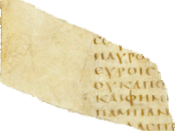The Medea by Euripides, Heroides XII: Medea to Jason by Ovid
Both Fifth century B.C. playwright Euripides and Roman poet and dramatist Ovid tell the story of Jason ditching Medea for another woman; however, they do not always share a perspective on the female matron's traits, behavior, and purpose. Euripides portrays a woman who reacts to injustice by beginning a crusade to avenge all who harmed her which she is prepared to see through even if it means resorting to the most contemptible methods. Ovid, on the other hand, tells of a much less extreme figure whose humble goal is only to persuade Jason to return. Despite these differences, both Medeas create trouble by acting with emotions instead of with reason, and as a result, put themselves in regrettable situations.
Euripides and Ovid present two entirely different sets of motivations for Medea's behavior which surface through her attitude towards Jason.
In the Athenian tragedy, it becomes clear from the onset that Medea harbors an unnatural and overwhelming hatred for Jason and anyone he is connected to. Granted, anger is a natural response when one spouse leaves his or her mate for another partner, but it should not consume the abandoned person's life. As the Chorus notes, "It often happens...You must not waste away" (156-158). Medea's stern rejection of this advice is puzzling to the reader, but her reasons soon become clear in a soliloquy following a meeting with Aegeus in which she states "Let no one think me a weak one" (807). Medea is a proud character whose self-image reflects an important person, but as was the case with her anger, she takes this idea to an extreme. The rage that follows Jason's threat to her authority motivates her to think and act destructively. Ovid, on...


